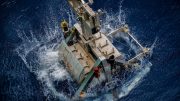United States President Donald Trump on Thursday signed an executive order on deep-sea mining that aims to pave the way for offshore resource extraction and cut the country’s critical minerals reliance on China.
The order aims to fast-track reviews and approvals for prospecting permits and the granting of leases for the exploration, development and production of seabed resources along the U.S. outer continental shelf.
It also gives U.S. Commerce Secretary Howard Lutnick 60 days to expedite reviews and seabed exploration license issuing and commercial recovery permits in areas beyond national jurisdiction. That could set up a clash with the International Seabed Authority of the United Nations, which has for several years been trying to formalize standards for mining in international waters, metals analysts at BMO Capital Markets said Friday in a note.
Thursday’s announcement builds on recent Trump moves – such as an executive order last week to increase American critical mineral production and a Section 232 tariff probe on all critical mineral imports – aimed at boosting U.S. production of the raw materials that power its economy.
“Our nation must take immediate action to accelerate the responsible development of seabed mineral resources, quantify the nation’s endowment of seabed minerals, reinvigorate American leadership in associated extraction and processing technologies, and ensure secure supply chains for our defense, infrastructure, and energy sectors,” Trump said in the order. “These resources are key to strengthening our economy, securing our energy future and reducing dependence on foreign suppliers for critical minerals.”
As global demand for critical minerals needed for zero-emissions technologies soars, companies and countries have been scouring the oceans for metals that can be used in smartphone and electric-vehicle batteries. An estimated 21 billion tonnes of polymetallic nodules are resting on the ocean floor in the central Pacific Ocean’s Nori Clarion-Clipperton Zone, located between Mexico and Hawaii.
U.S. waters are estimated to hold more than 1 billion metric tons of polymetallic nodules filled with manganese, nickel, copper and other critical minerals, Reuters reported Thursday, citing an unidentified U.S. official.
Undersea dominance
Driving the momentum for seafloor mining is a nervousness among U.S. government officials that China could dominate undersea mining like it has dominated critical minerals, Craig Shesky, chief financial officer of undersea explorer The Metals Company (Nasdaq: TMC), said in March.
Vancouver-based TMC, which intends to apply for exploration licences and permits in the second quarter, welcomed the news.
The executive order “marks America’s return to leadership in deep seabed minerals,” CEO Gerald Barron said in a statement.
“With a stable, transparent, and enforceable regulatory pathway available under existing U.S. law, we look forward to delivering the world’s first commercial nodule project—responsibly and economically. As always, we remain committed to acting in the best interests of our sponsoring states, partners, investors, and the planet.”
Focus on private sector
Trump’s latest order also directs administration officials to identify private sector interest and opportunities for seabed resource exploration, mining, and environmental monitoring in U.S. and international waters, as well as in other nations “that express interest in partnering with U.S. companies on seabed mineral development.” It didn’t identify the countries in question.
China, meanwhile, slammed the U.S. push to plough ahead with subsea mining in international waters.
The U.S. order violates international law and damages the interests of the international community, Agence France-Presse cited Chinese foreign ministry spokesman Guo Jiakun as saying Friday.
‘Greed over sense’
Thursday’s order also ignores efforts by the International Seabed Authority to create safeguards for deep-sea mining in international waters, according to Washington, D.C.-based advocacy group Oceana.
“This is a clear case of putting mining companies’ greed over common sense,” Oceana chief scientist Katie Matthews said in a statement. “Any attempt to accelerate deep-sea mining without proper safeguards will only speed up the destruction of our oceans. Mining the seafloor can cause irreparable harm to delicate ecosystems, which themselves are vital to ocean economies.”
The U.S. has not ratified the UN Convention on the Law of the Sea, which created the International Seabed Authority.






Be the first to comment on "Trump moves to fast-track deep-sea mining push"